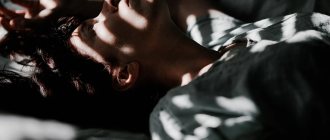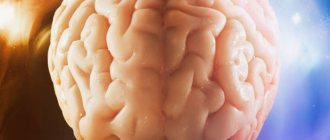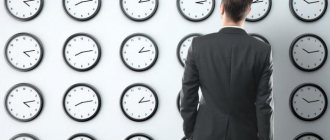“The monotonous battle of hours, the tedious story of the night...” sometimes drive a person to despair. He talks about the difference between insomnia, insomnia and sleep deprivation, as well as how to learn to sleep happily at night. Svetlana Sergeeva, neurologist at the Cecil Plus clinic, Ph.D., associate professor at the First Moscow State Medical University named after. I. M. Sechenova .
Oddly enough, there is no medical term for “insomnia.” This name was considered incorrect, since studies by our and foreign scientists did not reveal a complete lack of sleep in people who complained of being unable to fall asleep. If you really don’t sleep enough and you don’t like it, you constantly experience fatigue, daytime sleepiness, decreased concentration and performance, then you have insomnia.
Insomnia is defined as a deficiency in the quality and quantity of sleep needed for normal daytime activities. Moreover, it is necessary to fulfill both conditions, because in order to get enough sleep, a healthy adult, depending on his personal and psychophysiological characteristics and current state, needs from 4 to 9 hours.
Article on the topic Sleep quality: how to avoid insomnia and properly arrange your bedroom
Stress and nervous overexcitement
Stress can be caused by both negative (troubles at work, lack of money, unsettled life) and positive (love experiences, preparation for a holiday) emotions. Nervous exhaustion caused by frequent stressful conditions can provoke overexcitation of the nervous system. According to statistics, stress causes insomnia more often in women than in men.
The accumulation of a large number of tasks that a person does not have time to solve during the working day provokes insomnia. To normalize their sleep, people should pay attention to carefully planning their work time and strictly following the plan. The motto of people with a large “baggage” of unfulfilled tasks is to do everything on time, without putting it on the back burner.
Communicating with a large number of people during the day can also cause difficulty falling asleep. The mood in which these meetings took place plays an important role here. Vivid positive or negative impressions of a meeting force a person, lying in bed, to relive the current situation again and again, imagining what the events could have been like if any circumstances had changed.
Guilt is another of the strongest incentives to not sleep. Until a person gets rid of this annoying feeling, auxiliary methods will hardly help him.
Magic pill
“What about the miracle sleeping pills?” - you say. The modern approach involves treating the cause of insomnia, which should not be considered as a separate disease. Sleeping pills are prescribed only in case of emergency for a maximum of three weeks. During this period, as a rule, dependence and addiction do not form, and the doctor selects therapy for the underlying disease. Herbs and tinctures have a certain hypnotic effect, mainly due to their relaxing effect and reduction of anxiety.
There are a number of non-drug methods for treating insomnia: phototherapy - exposure to bright white light 2500 Lux, calming exercises - stretching, self-massage, breathing exercises, individually selected therapeutic music and “natural noises”. You can practice imagination exercises: it is useful to imagine the face of a sleeping person, to imagine what your own face should look like when falling asleep.
Interesting!
The Guinness Book of Records includes a 17-year-old California high school student, Randy Gardner, who stayed awake for 264.3 hours (eleven days) in 1965. It can be assumed that Randy felt very bad at the end of such a difficult experiment on himself: it is known that one of the most cruel tortures is sleep deprivation.
Watching exciting movies and shows
Often, after heartbreaking films or programs, viewers cannot fall asleep for a long time. The habit of watching such television projects leads to a shift in the time of falling asleep. As a result, a person gets up in the morning broken and unrested.
The best option for sensitive people is to avoid watching stimulating movies and shows before bed. Currently, it is not difficult to watch them recorded on the Internet at another convenient time, but not at night.
What is deprivation?
If a person deliberately deprives himself of sleep or someone deliberately prevents him from falling asleep, then this situation has the scientific name “sleep deprivation.” Individuals practice various sleep deprivation techniques to achieve an altered state of consciousness. Perhaps this is safer than drugs that also alter consciousness, but a significant deterioration in the well-being of sleep experimenters is guaranteed. After such experiments on yourself, you cannot drive vehicles or perform work that requires constant attention, since the brain seeks to make up for lack of sleep by uncontrollably switching off for several seconds. This phenomenon is called “microsleep”.
Alcohol intake
Alcohol causes a variety of reactions in people: from excitement to stupor. In some cases, alcohol can relax you and help you sleep. But in these cases we are talking only about a small dose of ethanol (no more than 30 ml). At the same time, you should not abuse such a “sleeping pill”: if you take it every evening, the dose will gradually increase. And this is already a path to alcoholism, no matter how good intentions justify drinking alcohol.
Since the body needs more time to recover after drinking alcohol than normal sleep, you should go to bed an hour or two earlier than usual.
Fatty foods before bed
Scientific research has shown that low fiber and high fat diets are directly linked to interrupted, shallow sleep.
Solution : arrange your menu in such a way that the last meal consists mainly of proteins, do not forget about vegetables and fruits.
It turns out that if you have digestive problems, it is better to sleep on your left side. There are 5 more reasons for this.
Use of stimulants
Some medications have a stimulating effect on the nervous system, even if they do not belong to the group of stimulants of the central nervous system. The doctor who prescribed them should warn the patient about their stimulating effect. This information is contained in the annotation for the medication.
A responsible patient, before taking any medications, even those prescribed by a doctor, should carefully study the instructions to avoid possible side effects and consequences. If the instructions for use contain a warning about possible insomnia while taking the drug, it is better not to take it immediately before bed.
Drugs also cause overexcitation in the brain, as a result of which a person cannot fall asleep for a long time. The best option to avoid insomnia in this case is to quit a life-threatening addiction.
general information
It's no secret that healthy and sound sleep is the key to excellent health and good mood. However, not every person manages to get enough sleep. This is especially true for residents of modern megacities, where every second person faces such a problem as insomnia .
How to fall asleep quickly and what methods of falling asleep quickly exist? What to do if you can't sleep? Why does a person suffer from insomnia and how to overcome it? We will try to answer these and other important questions in this material.
Coffee and strong tea
Coffee and tea are sources of caffeine, which has a stimulating effect on the cardiovascular and nervous system. Excessive passion for these drinks in some cases can cause addiction to them, when the body requires an increasing amount of the drink each time, and in others it can lead to overexcitation and extreme inhibition.
In medicine, extreme inhibition is the response of the nervous system to excessive exposure (above a threshold value). Large doses of caffeine, instead of causing stimulation, lead to depression of brain activity, but do not induce sleep. The brain is in a state of wakefulness, but at the same time reacts little to what is happening around. The circulatory system experiences a similar state. Thus, an overdose of caffeine may cause insomnia, but it will not improve performance.
To avoid this condition, you should drink your last cup of coffee or strong tea at least 2 hours before bedtime, and for people who are especially sensitive to caffeine - in the afternoon.
What is your productivity before and after a sleepless night?
Even a day without sleep will affect your well-being
It is recommended for an adult to sleep 7-9 hours a day. However, we know how difficult it is to live according to the regime. The only thing that gets more difficult is in the morning, when you have to literally drag yourself out of bed. When you are 20, permanent lack of sleep will manifest itself in dark circles under the eyes (which can be removed in a couple of minutes with the help of concealer). But for mature women, insomnia costs much more. Gray complexion, reluctance to do anything and hatred of the whole world. In addition to your appearance, insomnia also affects your productivity.
| Until lack of sleep | After lack of sleep |
| You easily concentrate even on uninteresting work. You can work continuously for at least a couple of hours. | You are constantly distracted. No matter what you do, you find it difficult to concentrate. You endlessly look at the clock, then out the window, or just at the wall. Do you think these are the tricks of your laziness? No. It’s just that your brain is constantly looking for ways to “stir up” you so that you don’t fall asleep on the spot. |
| You look at the world positively. Life seems full of wonderful things and people. You want to develop, work, relax. You are full of energy and optimism. | You are worried. When you stay up all night, the world becomes black and white. People are divided into good and bad (and the bad predominate). It’s difficult for you to raise your butt, because your anxiety level is off the charts. |
| You are kind and cheerful. The daily routine does not cause you aggression or even slight irritation. You deal with troubles that may arise during the day in no time. | You are aggressive. Literally every little thing is ready to throw you off balance. Moreover, the reaction to the stimulus will be the same - anger. |
| You are rational. When you have adequate sleep, you are more thoughtful. In a doubtful situation, you are more likely to make the right decision. | You are a risk taker. Do you know in what situations a woman calls her ex? Either when I drank, or when I didn’t get enough sleep. Insomnia makes you more emotional. You “turn off” your brain by following your feelings. As practice shows, this is not always good. |
Long-term circadian rhythm disturbances
A non-standard work schedule often provokes sleep disturbances. Frequent night shifts can lead to chronic sleep deprivation due to reduced sleep time. At the same time, when going to bed after a night shift, a person tosses and turns for a long time, cannot fully fall asleep, and after falling asleep, he often sleeps restlessly and shallowly. This problem needs to be solved radically - by changing the work schedule.
Long-term disruptions to the circadian rhythm can lead to hormonal imbalances and mental disorders, which will inevitably progress with age.
Upcoming Events
Insomnia often plagues people before upcoming events:
- wedding;
- operation;
- business trip;
- an important meeting;
- long trip.
If a person has some event coming up, not tomorrow, but in a week or two, then you shouldn’t think about it every night. Every person should learn to be distracted and solve problems as they arise. This will not only normalize sleep, but also reduce the overall level of anxiety and irritability.
Recommendations
- If you find that you have insomnia or lack of sleep, you should not start taking sleeping pills on your own. You can only harm yourself, or become addictive, after which you will have to constantly increase the dose, since without pills it will be completely unrealistic to fall asleep on your own. That’s why you should definitely see a specialist who will prescribe competent and safe treatment.
- If this happens, and you were unable to rest for part of the night, be sure to set aside at least half an hour during the day to take a nap. This will at least give you a little energy and increase your performance.
- Take a warm bath in the evening or drink a glass of warm milk. I talked about this and what types of insomnia exist in this article.
- Before you get behind the wheel, be sure to listen to how you feel, and if you feel you need to rest, look for solutions, maybe someone else can drive the car, or there is an opportunity to delay the trip, after all, you are risking not only your life , and also those around you.
Scary dreams
People who tend to have nightmares in their sleep find it difficult to fall asleep. Therefore, they can exhaust themselves by watching TV, working on the computer, reading and other “concerns” that they deliberately invent for themselves. However, such behavior is not a solution to the problem, it only aggravates it.
People who regularly have bad dreams need a confidential conversation with their family, a meeting with a psychologist, and in some cases, with a psychiatrist. Psychological techniques and the use of medicinal and non-medicinal methods will help get rid of bad dreams and, accordingly, eliminate insomnia.
How long should sleep last?
This question is purely individual.
For some, five hours is enough, while others cannot get enough sleep even in ten. Doctors have long been discussing the topic of how long sleep should be. Previously it was believed that eight hours was enough to restore strength. But in recent years, many have disagreed with this conclusion.
It is believed that it is not time that affects a person’s well-being, but the quality of sleep.
Continuous sleep, the presence of all phases of sleep, as well as the emotional state of the person with whom he fell asleep is very important.
In any case, sleep duration is divided according to age criteria:
- Newborns spend almost the entire day sleeping. With age, this time decreases;
- for infants, sleep time ranges from 14 to 16 hours;
- from the age of seven months, the duration of night sleep decreases to 10 hours;
- from the age of sixteen, eight hours a day is enough;
- for older people whose age exceeds 50 years, doctors note that the duration of night rest can be 5-8 hours:
- people who are sick should increase their rest time to help the body recover.
Uncomfortable sleeping conditions
Uncomfortable sleeping conditions can cause insomnia. It can be:
- lights or TV on;
- uncomfortable mattress or pillow;
- loud music, barking, noise, or snoring;
- annoying insects;
- hot or cold room;
- lack of oxygen.
The best way to combat insomnia in these cases is to change your sleeping conditions. For example, you can turn off the TV or cover the lantern shining through the window with thick curtains. But for various reasons this is not always possible.
In such cases, those who cannot fall asleep need to create comfortable conditions for their sleep. For example, special glasses for sleeping can easily combat the problem of having the lights on; earplugs can easily combat the problem of noise behind the wall or a spouse snoring. You can get rid of uncomfortable temperature conditions by changing blankets and night clothes: if it’s hot, put on a T-shirt instead of pajamas and cover yourself with a thin sheet, if it’s cold, put on warm pajamas instead of a T-shirt and cover yourself with an additional warm blanket.
The brain suffers from oxygen starvation, so airing the room before bed is a good habit. Firstly, fresh air fills the room with oxygen, secondly, air exchange is needed to remove musty and other foreign odors from the room, and thirdly, the incoming night air cools the sleeping room.
Effective ways to stay awake all day
Are you going to stay up all night and the next day?
We offer effective tips:
- Chew menthol gum
. The refreshing effect is secondary, the main thing is the chewing movements. You will deceive the brain, it will become active, deciding that the process of digesting food will now begin. Insulin will begin to be produced, causing a feeling of cheerfulness. - Remember to charge
. Do several push-ups, jump, and do squats. Physical exercises performed at intervals of 30-40 minutes. Activity will speed up the flow of oxygen to the body's cells, giving it additional energy. The ideal solution is a short walk. According to scientists, a quarter of an hour of walking provides two hours of productivity. - Let a little coolness into the room
. Fresh air is important. Open a window, turn on a fan or air conditioner. Feeling tired faster in a stuffy room or car. The coolness leaves the brain tense and the body activated. - A slight feeling of hunger will help you stay awake at night
. Skip one meal. The body has to spend energy on digestion, and a heavy lunch makes you feel sleepy. - Effective washing
. Rinse your wrists with water and you will feel more energetic. This treatment works great on hot days when you need to get rid of headaches caused by high temperatures. - Listen to rhythmic and slightly annoying music at low volume
. It will provide the desired emotional response, stimulating the necessary areas of the brain. If possible, sing and wave your head to the beat. Soothing and familiar music is ineffective. It is advisable that you do not understand the words of the song - your brain activity will increase. - Get bright lighting
. If the sun has already set, trick your internal clock by turning on all the lights in the room. When there is little light around, the body relaxes and the brain sends signals about the need to sleep.
Mental illness
Best materials of the month
- Coronaviruses: SARS-CoV-2 (COVID-19)
- Antibiotics for the prevention and treatment of COVID-19: how effective are they?
- The most common "office" diseases
- Does vodka kill coronavirus?
- How to stay alive on our roads?
Insomnia often accompanies mental disorders in people. Anxiety and depression of varying degrees are constant accompaniments of mental illness. Pathological foci form in the brains of mentally ill people, which lead to overexcitation or deep inhibition of the person. The nervous system experiences an artificial energy deficit, and the circulation of pathological impulses in the brain forces the body to stay awake.
In the initial stages of mental disorders, patients often experience persistent sleep disturbances: from difficulty falling asleep to complete insomnia. If specialized treatment for such patients is not carried out in time, their illness and insomnia will progress, leading to irreversible changes and consequences.
What problems does poor sleep at night indicate in an adult?
The most common sleep disorder is insomnia . Its signs include difficulty falling asleep, shallow sleep and frequent awakenings at night. Due to shallow and short sleep, a person feels tired in the morning, as a result of which the quality of life deteriorates.
Insomnia is most often preceded by depression, alcoholism, liver disease, hypertension , allergies or other ailments. In addition, insomnia can occur due to the following reasons:
- Psychosomatic disorders;
- Difficulty breathing;
- Parkinson's disease;
- Restless legs syndrome.
The second sleep-related problem is hypersomnia. This disease is characterized by an increase in sleep duration with constant daytime sleepiness. Moreover, the causes of the disease are often associated with brain diseases and hormonal changes.
Along with prolonged sleep, a person may experience depression, anxiety and nervousness.
The development of hypersomnia is provoked by:
- Mental disorders;
- Alcoholism;
- Abuse of sleeping pills;
- Deterioration of respiratory function, etc.
A shift in daily routine also causes poor sleep at night in adults. Violation of the regime can be temporary or permanent. Temporary disturbances are usually associated with night work, but permanent ones are often determined by a person’s chronotype. For example, it is more difficult for night owls to fall asleep at a certain time, which is why their bedtime is more often delayed than for larks.
Sleep pathologies are also considered parasomnias , which include:
- Sleepwalking . Walking and other actions in a dream are traumatic for the sleeping person and the people living next to him. While driving, a person may trip, hit, or unknowingly cause harm to household members.
- Enuresis is involuntary urination at night.
- Night Terror . A condition when a person wakes up at night from severe fright. The attack is accompanied by increased heart rate and severe sweating. The phenomenon is quite rare in adults and most often occurs in children.
Somatic pathologies
Diseases of various organs and systems are often accompanied by pain. Pain causes discomfort and, as a result, leads to difficulty falling asleep in the sick person. Tossing and turning in bed, searching for a comfortable or forced position, going for medicine or going to the toilet ends in lack of sleep. Regular repetition of this situation aggravates the patient’s condition, causing psychosomatic depressive states, which are extremely difficult to get rid of.
Pain cannot be tolerated: it must be eliminated. The sooner the cause of evening (night) discomfort is determined and appropriate treatment is carried out, the less consequences there will be for the patient’s psyche.









